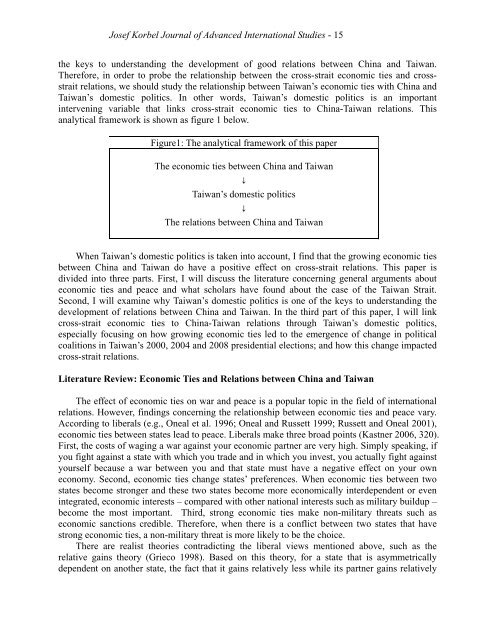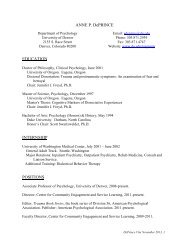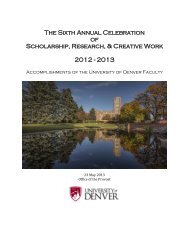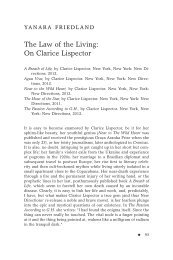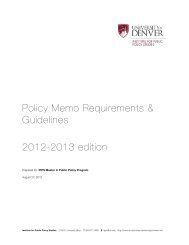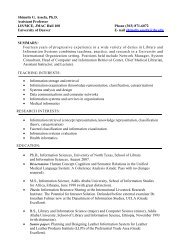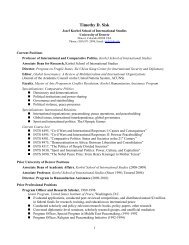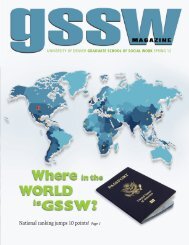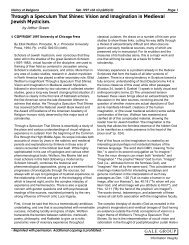Chien-Kai Chen, “China and Taiwan: A Future of Peace? A Study of ...
Chien-Kai Chen, “China and Taiwan: A Future of Peace? A Study of ...
Chien-Kai Chen, “China and Taiwan: A Future of Peace? A Study of ...
Create successful ePaper yourself
Turn your PDF publications into a flip-book with our unique Google optimized e-Paper software.
Josef Korbel Journal <strong>of</strong> Advanced International Studies - 15<br />
the keys to underst<strong>and</strong>ing the development <strong>of</strong> good relations between China <strong>and</strong> <strong>Taiwan</strong>.<br />
Therefore, in order to probe the relationship between the cross-strait economic ties <strong>and</strong> crossstrait<br />
relations, we should study the relationship between <strong>Taiwan</strong>’s economic ties with China <strong>and</strong><br />
<strong>Taiwan</strong>’s domestic politics. In other words, <strong>Taiwan</strong>’s domestic politics is an important<br />
intervening variable that links cross-strait economic ties to China-<strong>Taiwan</strong> relations. This<br />
analytical framework is shown as figure 1 below.<br />
Figure1: The analytical framework <strong>of</strong> this paper<br />
The economic ties between China <strong>and</strong> <strong>Taiwan</strong><br />
↓<br />
<strong>Taiwan</strong>’s domestic politics<br />
↓<br />
The relations between China <strong>and</strong> <strong>Taiwan</strong><br />
When <strong>Taiwan</strong>’s domestic politics is taken into account, I find that the growing economic ties<br />
between China <strong>and</strong> <strong>Taiwan</strong> do have a positive effect on cross-strait relations. This paper is<br />
divided into three parts. First, I will discuss the literature concerning general arguments about<br />
economic ties <strong>and</strong> peace <strong>and</strong> what scholars have found about the case <strong>of</strong> the <strong>Taiwan</strong> Strait.<br />
Second, I will examine why <strong>Taiwan</strong>’s domestic politics is one <strong>of</strong> the keys to underst<strong>and</strong>ing the<br />
development <strong>of</strong> relations between China <strong>and</strong> <strong>Taiwan</strong>. In the third part <strong>of</strong> this paper, I will link<br />
cross-strait economic ties to China-<strong>Taiwan</strong> relations through <strong>Taiwan</strong>’s domestic politics,<br />
especially focusing on how growing economic ties led to the emergence <strong>of</strong> change in political<br />
coalitions in <strong>Taiwan</strong>’s 2000, 2004 <strong>and</strong> 2008 presidential elections; <strong>and</strong> how this change impacted<br />
cross-strait relations.<br />
Literature Review: Economic Ties <strong>and</strong> Relations between China <strong>and</strong> <strong>Taiwan</strong><br />
The effect <strong>of</strong> economic ties on war <strong>and</strong> peace is a popular topic in the field <strong>of</strong> international<br />
relations. However, findings concerning the relationship between economic ties <strong>and</strong> peace vary.<br />
According to liberals (e.g., Oneal et al. 1996; Oneal <strong>and</strong> Russett 1999; Russett <strong>and</strong> Oneal 2001),<br />
economic ties between states lead to peace. Liberals make three broad points (Kastner 2006, 320).<br />
First, the costs <strong>of</strong> waging a war against your economic partner are very high. Simply speaking, if<br />
you fight against a state with which you trade <strong>and</strong> in which you invest, you actually fight against<br />
yourself because a war between you <strong>and</strong> that state must have a negative effect on your own<br />
economy. Second, economic ties change states’ preferences. When economic ties between two<br />
states become stronger <strong>and</strong> these two states become more economically interdependent or even<br />
integrated, economic interests – compared with other national interests such as military buildup –<br />
become the most important. Third, strong economic ties make non-military threats such as<br />
economic sanctions credible. Therefore, when there is a conflict between two states that have<br />
strong economic ties, a non-military threat is more likely to be the choice.<br />
There are realist theories contradicting the liberal views mentioned above, such as the<br />
relative gains theory (Grieco 1998). Based on this theory, for a state that is asymmetrically<br />
dependent on another state, the fact that it gains relatively less while its partner gains relatively


